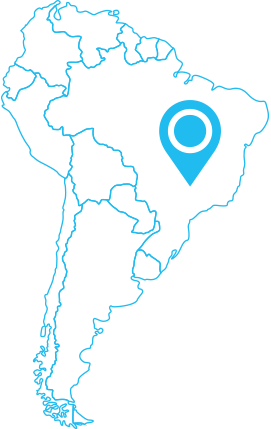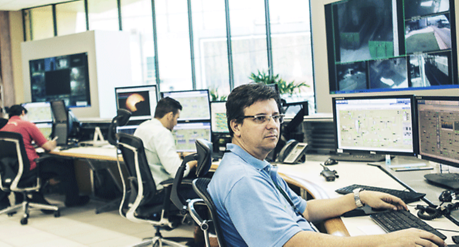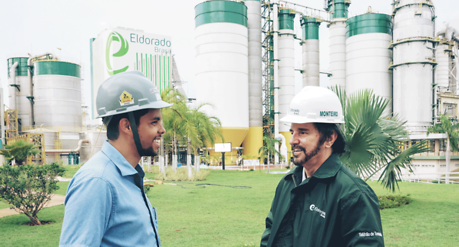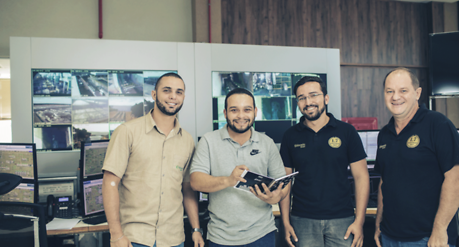Facts
Company:
Eldorado Celulose
Location:
Três Lagoas, Brazil
Product:
Bleached market pulp (1.7 million adt/a)
Autonomous automobiles use a variety of techniques to gather data about their surroundings and feed this data to advanced control systems that interpret the inputs and identify appropriate navigation paths. The development of autonomous pulp mills using Metris OPP is following a similar path – and Eldorado Celulose is an early adopter of this technology. The results have a big economic payback.

Eldorado Celulose
Três Lagoas, Brazil
Bleached market pulp (1.7 million adt/a)
Experiments began with automated operation back in the 1920s or even earlier. The first truly autonomous cars appeared in the 1980s. The development of autonomous mills is moving at a much faster pace thanks to smart sensors and tremendous computing power in small packages that are part of ANDRITZ’s Metris OPP (Optimization of Process Performance).
Metris OPP is a combination of sophisticated software and knowledgeable human experts. This system is aimed at improving production through data mining and control strategies, with the goal of reducing costs and increasing profits. It has been around in various forms for over a decade and is constantly evolving and improving. Metris OPP has been implemented in over 50 plants in 14 countries. Arguably the most impressive Metris OPP project is the autonomous mill at Eldorado Celulose near Três Lagoas (MS), Brazil.
The control room at Eldorado is the action center for production control. OPP software resides in the DCS for advanced control of fiberline processes and also links process, maintenance, and asset management information into one network.
“Autonomous implies acting independently,” explains Lonardo Soares Figueiredo, ANDRITZ’s OPP Project Manager at Eldorado. “Most of our work at Eldorado to date still has an operator in the driver’s seat, so perhaps ‘automated mill’ more accurately escribes what we are doing today – with an eye towards autonomy in the future.”
Carlos Monteiro,
Industrial Director, Eldorado Celulose
Carlos Monteiro, Eldorado’s Industrial Director, does not care whether it is autonomous or automated. Monteiro is focused on results. “I can tell you this,” he says. “The results in the first year have been impressive.”
An increase in operational efficiency from 89.2 to 93%; variable cost reduction of 7%; 38,000 admt production over the budgeted amount; AND controls in automatic mode 95% of the time.
Arthur Santos, ANDRITZ OPP Analyst (left), gives a progress update to Carlos Monteiro, Eldorado’s Industrial Director, while touring the fiberline. According to Monteiro, OPP has made a “big difference” in Eldorado’s performance.
Increasing operating efficiency by 3.8% may not sound like a tremendous improvement. But in a mill currently producing 1.7 mill t/a – that amount is equivalent to millions of Brazilian real in the end. The fact that Eldorado operates sustainably at 13% above design
capacity without any additional capital investments is proof of its efficiency.
But why would a mill already operating in the top tier choose a service like Metris OPP? “We are well-managed and have tight cost controls,” says Leonardo Pimenta, Technical Control Manager at Eldorado and in charge of the OPP project. “But we can always improve our position. We focus on every detail to stay ahead of our competitors. Metris OPP is a tool that helps us stay ahead.”
Leonardo Pimenta,
Technical Control Manager, Eldorado Celulose
The high level of automation at Eldorado didn’t come over night. All changes within the processes of the mill were and are done step-by-step and executed on a daily basis. The advantage of this approach is seen in the smooth, gradual integration of the process improvements without impacting daily mill routines.
“The main challenge was never the engineering itself, but rather the adjustments required in the way that operators and managers worked,” Figueiredo says.
“The key to us achieving results is the belief that processes are better controlled by automatic, advanced process control than by manual operator intervention,” says Pimenta. “Stability is essential. Every loop in automatic mode makes us money.”
Tiago Garcia (Utilities DCS Operator), Douglas Freitas (Power Boiler DCS Operator), Adriano Cabral (Automation Analyst) and José Spadon Jr. (Fiber Line DCS Operator)
“They were pretty high targets, especially for a well-run mill,” Figueiredo admits. “But we were committed – both Eldorado and us – to achieving them. We signed an agreement in August 2016 with the idea that we would have all the front-end work done by the end of the year so we could start measuring results in January 2017.”
Early in the project, Eldorado and ANDRITZ set clear goals against which to measure success. These goals, known as Key Performance Indicators (KPIs), form the basis for 30% of ANDRITZ’s payment, so they are important. What gets measured gets done.
The three KPIs selected as being most critical are: 1) operational stability in the 90-93% range; 2) a reduction in variable costs versus budget; and 3) all the APC routines will be turned on at least 90% of the time.
Arthur Santos, OPP Technical Specialist at ANDRITZ, believes that the front-end work of analyzing control loops and then “tuning” each loop is responsible for helping achieve the results Eldorado is seeing today. “It all starts with reliable data, which comes from reliable instruments and sensors,” Santos says. “We completed over 40 projects using combinations of smart sensors, APC, loop tuning, data mining, and so on that created the infrastructure and a standardized way of operating.”
Today, the Eldorado mill runs in automatic mode 97-98% of the time, enabling Eldorado to progress from basic control to “hands off” and even “eyes off” operation.
Read the success story here.




